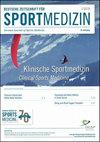海拔1250 ~ 2000m滑雪初学者有氧运动对血氧运输参数的影响
Q3 Health Professions
引用次数: 0
摘要
问题:低海拔停留(1250m)和广泛的娱乐性有氧活动,如在中低海拔(1250-200m)滑雪,及其对氧气输送参数的影响尚未得到彻底调查。方法:实验组(N=17)接受了一次干预,一次典型的10天滑雪旅行。他们在1250米的高空睡觉,在1250-200米的高空进行5-6小时的有氧运动(滑雪)。对照组(N=15)停留在海平面并进行常规活动。测量两组患者出行前和出行后48小时的铁蛋白水平、网织红细胞计数、红细胞参数和红细胞生成素。结果:实验组网织红细胞计数增加(44.5±16.6至67.9±19.18 G/L),红细胞生成素下降(6.04±2.39至4.91±1.54 IU/L,ANOVA p=0.001)。88%的实验组受试者铁蛋白水平下降,网织红血球计数增加,而对照组则双向变化。红细胞初始浓度被发现是网织红细胞增加变化的良好预测指标,而铁蛋白储备则不然。干预后其他参数未观察到显著变化。讨论:在娱乐人群中,在低海拔地区睡觉,再加上滑雪等每天持续时间较长的有氧运动,会引起红细胞生成的变化。本文章由计算机程序翻译,如有差异,请以英文原文为准。
The effects of aerobic exercise in ski beginners at altitudes of 1250-2000m on blood oxygen transport parameters
Problem: Lower altitude stay (1250m) and extensive recreational aerobic activity like skiing at lower to moderate altitude (1250-2000m) and its effect on oxygen transport parameters had not been thoroughly investigated. Methods: The experimental group (N=17) underwent an intervention, a typical 10-day ski-trip. They slept at 1250 m and performed 5-6 hours of aerobic activity (skiing) at 1250-2000m altitude. The control group (N=15) stayed at sea level and performed their regular activities. The ferritin levels, reticulocyte count, RBC parameters and erythropoietin before and 48 h after the trip were measured in both groups. Results: The reticulocyte count increased (44.5±16.6 to 67.9±19.18 G/L) and somewhat surprisingly erythropoietin decreased in experimental group (6.04±2.39 to 4.91±1.54 IU/L, ANOVA p=<0.001). Ferritin levels decreased and reticulocyte count increased in 88% of all experimental group subjects while in control group it changed in both directions. The initial erythrocyte concentration was foundto be a good predictor of reticulocyte increase changes, while ferritin reserveswasdid not. No significant changes after intervention were observed in other parameters. Discussion: In recreational population, sleeping at lower altitudes in combination with aerobic activity of longer daily duration like skiing, elicits changes in erythropoiesis.
求助全文
通过发布文献求助,成功后即可免费获取论文全文。
去求助
来源期刊

Deutsche Zeitschrift fur Sportmedizin
Medicine-Orthopedics and Sports Medicine
CiteScore
2.00
自引率
0.00%
发文量
30
审稿时长
>12 weeks
期刊介绍:
The Deutsche Zeitschrift fuer Sportmedizin - German Journal of Sports Medicine has been
founded in 1951 and is dedicated to the biomedical science and clinical practice of Sports
Medicine and its border fields which investigate the influence of exercise, physical training
and sports as well as lack of exercise to healthy and sick people of all age-groups, related to
prevention, diagnosis, therapy, rehabilitation and physical training.
Manuscripts which deal with actual scientific and medical findings, new hypotheses, actual
controversies and problems in real life will be published. Possible Topics are physiology
and pathophysiology of exercise, medical and biological findings, the medical therapy of
exercise-related medical problems, epidemiology of sedentary lifestyle and related
disorders, therapy of sports injuries - especially the conservative postoperative treatment
of injuries -, medical training and rehabilitation medicine, as well as special social,
cultural, psychological and special science-related aspects of the entire scientific field.
 求助内容:
求助内容: 应助结果提醒方式:
应助结果提醒方式:


